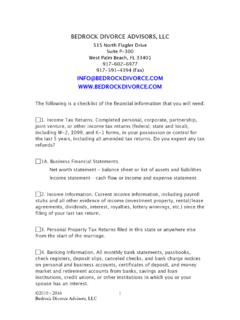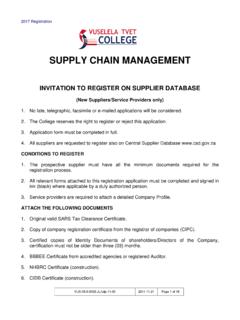Transcription of Innovation - Arthur Cox
1 Earlsfort Centre, Earlsfort Terrace, Dublin 2, Ireland | tel: +353 (0)1 618 0000 | fax: +353 (o)1 618 0618 | email: | web: ..This document contains a general summary of developments and is neither a complete nor definitive statement of the law. Specific legal advice should be obtained before taking on business in IrelandThe methods generally preferred by foreign investors to carry on business in Ireland are as set out in Table 1. Other legal forms allowed in Ireland sole trader, partnership, unlimited company, company limited by guarantee are not covered in this guide, but advice can be provided on of an Irish private company limited by sharesIrish companies are governed by 15 statutes and a large number of statutory instruments which together constitute the Companies Acts.
2 The primary Act remains the Companies Act 1963 which is similar in many respects to the English Companies Act 1948. Following the recommendations of the Irish Company Law Review Group chaired by Arthur Cox s Dr Tom Courtney, Irish company law is due to be transformed by a consolidating and reforming statute that will repeal over 25 enactments and replace them with one unified body of law which will have a particular focus on the private company limited by shares. It is not expected that this will become law before and PublicForeign investors intending to carry on business in Ireland most commonly look to form a private company limited by shares, rather than a public company.
3 This is because fewer obligations apply to a private than a public company, and the restrictions applicable to a private company (see Table 2) generally do not concern a foreign investor, who would not intend that the Irish company would have a large number of shareholders. Contents Carrying on business in Ireland 01 Characteristics of an Irish private company limited by shares 01 Forming an Irish Limited Company 02 Ongoing obligations 03 Change of Name / Registration of business name 03 Registering a place of business in Ireland 04 Establishing a branch in Ireland 04 Transfer of SE from UK to Ireland 05 Inward cross-border mergers 06 Arthur Cox s Company Compliance & Governance Group 08 Contacts 10 InnovationGuide to Irish Company LawFormation and Registration of Irish Companies.
4 Branches and Places of BusinessTable 1 Options for foreign investors to carry on business in Ireland Acquiring an Irish company Forming an Irish company Registering a place of business Establishing a branch Forming a Societas Europaea Cross-border merger with existing Irish company02 Share CapitalThere is no upper limit on the share capital which a company may be authorised to issue, nor is there any restriction on the currency or denomination amount of shares. The amount of the authorised share capital and the currency and denomination of shares must be stated in the company s Memorandum and Articles of Association, but can be amended (as long as this does not result in a reduction in issued share capital) by a resolution of the members.
5 The Articles may provide for different classes of shares and attach differing rights ( regarding voting and dividend) to such different is no minimum share capital amount that must be issued by a private company (a public limited company must have a minimum issued share capital of 38, ). A private company may have between one and 99 members (a public company must have at least seven). Shares may be issued for non-cash consideration. The liability of members is of course limited to the amount (if any) unpaid on their shares. Management StructureEvery Irish company must have at least two directors (all of whom must be natural persons, not companies) and a company secretary (which may be a company).
6 Under Irish law, a person may only act as director of 25 Irish companies (although certain exemptions apply, for example public companies are not included, and a holding company and its subsidiaries are counted as one). We therefore do not provide formation directors. We do however provide a full range of corporate secretarial services, as at page 8 are required to make certain personal information publicly available, as set out in Table 3. Directors also have a statutory obligation to notify the company of any interest they may hold in shares or debentures of the company and of any subsidiary, holding company or any subsidiary of the company s holding company, including a company incorporated outside the State.
7 There are no nationality requirements for the directors or secretary of an Irish company, but a company must have at least one director resident in the EEA or meet either of the two following conditions: obtain a certificate from the Revenue Commissioners to the effect that the company has a real and continuous link with an economic activity being carried out in the State; or put in place a bond in the amount of 25,395 which can be called upon if the company fails to pay certain fines or penalties (the premium for a two year period is approximately 1,300 plus the legal fee for putting the bond in place).
8 Forming an Irish Limited Company The following must be filed with the Companies Registration Office (the CRO ): Form A1 setting out the details in Table 4; memorandum and articles of association; and the appropriate private company can be incorporated within a guaranteed five working days under the online scheme, if the memorandum and articles are in a form approved by the CRO, or 10 days otherwise. Often it will be possible to incorporate in 24-48 can look after all aspects of the formation of an Irish company and will walk our clients through the process with minimum trouble.
9 Tax advice in relation to incorporation can be obtained on request from our colleagues in the firm s Tax Department. Table 2 Restrictions Applicable to Private CompaniesA private company must, by its articles: Restrict the right to transfer its shares Limit the number of its members to 99 or fewer persons (excluding employees) Prohibit any invitation to the public to subscribe for shares( Irish private companies may list certain debt instruments)Table 3 Directors' Disclosure Requirements Full name and any former names Residential address Nationality and date of birth Occupation List of worldwide directorships held over the past 10 yearsTable 4 Information to be included in Form A1 on registration Company name Registered office address (must be in Ireland)
10 Details of the directors and secretary Details of the company s subscribers and shares held Nature of the principal activity of the company Place(s) in Ireland where it is proposed to carry on the activity Place of central administration of the company (need not be in Ireland)03 GUIDE TO IRISH COMPANY LAW Ongoing ObligationsRequirement to prepare and have audited accountsEvery Irish company is required to prepare individual accounts and, if it is a parent undertaking, to prepare consolidated accounts for the group. These accounts will also generally require to be audited. An exemption may apply from having individual accounts audited if the company falls below the relevant thresholds (as set out in Table 5) in the current and preceding financial year, and its annual returns are up to date.







